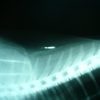Neutering is a routine surgery that can be easily carried out in any veterinary practice. During the surgery, the dog’s reproductive organs are removed. In male dogs, this means an orchiectomy (removal of the testicles) and in female dogs, we refer to ovariohysterectomy (removal of ovaries and uterus)
Neutering has two types of benefits for dogs: those for its health and those for its mental wellbeing.
As far as the male dog is concerned, the testicular removal has a positive effect on the animal’s health:
- by helping to prevent testicular cancer, prostate cancer and other prostate and testicular conditions
- by reducing the possibility of peripheral hernia in older, non neutered dogs
With regards to mental wellbeing:
- it reduces aggression and fighting and as a result, any injuries linked to it
- it helps prevent tendencies to flee in order to find a female mate
- and it contributes to preventing other unwanted behaviours such as urinary territorial marking or mating tendencies with people and objects
Similarly, in a female dog the ovariohysterectomy can:
- help prevent breast cancer (in fact, the earlier a dog is neutered, the lesser the likelihood of cancer), uterine and ovarian cancer as well as uterine infections (pyometra)
- prevent undesired pregnancies
- diminish the danger of hormonal disorders
- relieve us from the estrous cycle every 6-8 months, which can last up to 3 weeks each time. During this time, there can be intense and unpleasant odors and blood. The animals can be particularly anxious and have a tendency to try and flee. During the entire time that a female is in heat, male dogs will usually persistently linger in the vicinity.
Neutering does not in any way change the animal’s character. Neutered dogs do not become passive as many would have you believe, using this as an excuse to avoid surgery. A happy and lively dog will remain just as happy and lively.
What is the best age for neutering?
Sexual maturity for both male and female dogs comes at approx. 6-7 months of age (there are differences depending on the breed). To prevent unwanted pregnancies, eliminate the changes of developing breast/uterine/testicular/prostate cancer as well as other hormonal changes, it is best when a dog is neutered before this age.
How is it done? Initially, an appointment needs to be booked. You will need to bring your animal for tests and a pre-anaesthetic assessment a few days before surgery.
Neutering is a common procedure performed with the animal under general anaesthetic. For this purpose, you will be requested to not feed your dog for at least 12 hours prior to surgery.
Your dog will remain at the veterinary clinic for a few hours post-surgery to ensure it has woken up and fully recovered from the anaesthetic. You will be able to take your dog home on the same day.
After the surgery and once you have gone home, there is not many things you need to do as the animal’s recovery time after neutering is quite speedy.
It would be good to spend the first night after surgery close to your dog as the anaesthesia can cause discomfort and disorientation, resulting in your dog being a little unstable and possibly crying. This does not apply to the following day post surgery.
On the day of the surgery, your dog should not be fed upon returning home. However, your dog can eat as normal the following day.
During the operation, painkillers and antibiotics are administered. If needed, you will be asked to administer antibiotics and painkillers once you’ve returned home with your dog as part of the post-surgical treatment.
The stitches used are dissolvable. Approx. 10 days after the operation, they can be removed. If deemed necessary, they may be left in to dissolve themselves.
The incision is very small and your dog will probably not be bothered by it. However, should this occur and the dog tries to lick or scratch the wound, then a special cone-shaped collar can be provided to avoid any injuries.



 Ελληνικά
Ελληνικά
